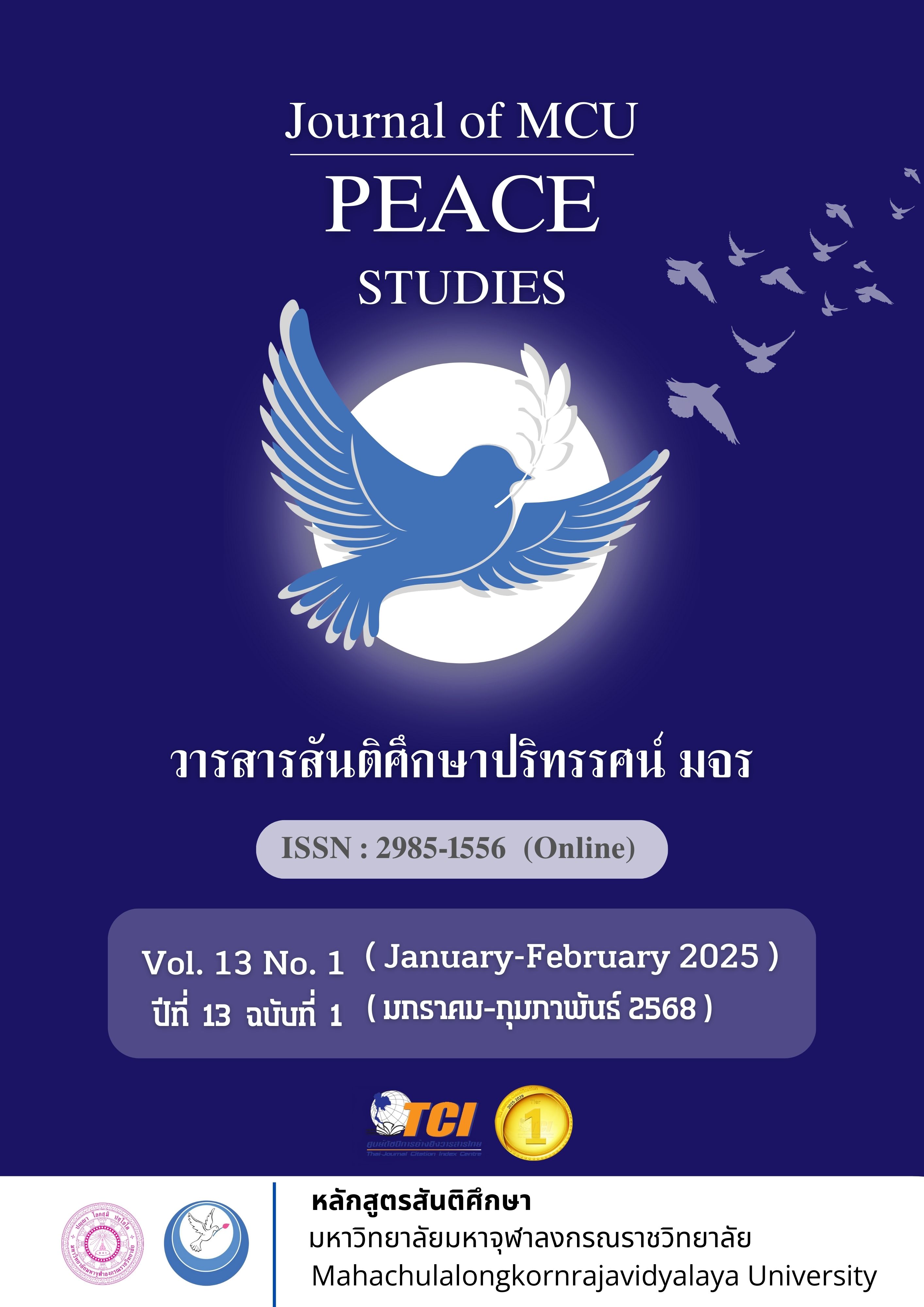The Management of the Devata ̅bali ̅ Ritual through Buddhist Peaceful Means
Main Article Content
Abstract
The study had the following objectives: 1) to investigate the context, problems, and needs for the management of the Devatābalī ritual, as well as concepts related to the practice of the Devatābalī ritual; 2) to explore the Buddhadhamma that supports the management of the Devatābalī ritual; and 3) to present the management of the Devatābalī ritual through Buddhist peaceful means. The study employed a qualitative research method, collecting data from documents, in-depth interviews with 15 participants, and a focus group discussion with 8 experts. The data obtained were analyzed using content analysis.
The study found the following results: 1) The Devatābalī ritual in the present era has changed from its original form, with a tendency to promote wrong beliefs, tie to superstition, prioritize material values over spiritual ones, and fail to protect the environment. The concepts surrounding the practice of the Devatābalī ritual reflect human beliefs in the supernatural or sacred things, which people worship to show gratitude, ask for blessings, and build positive relationships. This ritual is rooted in personal belief, as well as the traditions and cultures of each group. The objectives of the ritual are mainly: (1) to ask for blessings; (2) to show gratitude; (3) to make offerings; (4) to protect oneself from danger; and (5) to build morale. 2) The Buddhadhamma that supports the management of the Devatābalī ritual includes the following: (1) Bhoga-ādiya, which refers to five reasons for earning and having wealth; performing the ritual allows one to worship the deities according to one’s faith; (2) Anussati, which refers to recollection; performing the ritual allows one to recollect the deities and contemplate the virtues that enable people to become like gods, as can be found in oneself; and (3) Tisikkhā, or the threefold training, which refers to dāna (giving), sīla (morality), and bhāvanā (development). 3) The management of the Devatābalī ritual through Buddhist peaceful means includes the following five principles: (1) preserving the core of the ritual; (2) adapting; (3) building understanding and participation; (4) using modern technology and media; and (5) integrating with the threefold training.
Article Details

This work is licensed under a Creative Commons Attribution-NonCommercial-NoDerivatives 4.0 International License.
Views and opinions expressed in the articles published by The Journal of MCU Peace Studies, are of responsibility by such authors but not the editors and do not necessarily reflect those of the editors.
References
Nuchit, P. (2006). Rituals and Beliefs Concerning the House-Raising Ritual of the City Pillar Shrine, Phra Wo Phra Ta, Mueang District, Nong Bua Lamphu Province. (Master’s Thesis). Loei Rajabhat University. Loei.
Phrakrusirirattananuwat et al. (2012). Vows and Sacrifices: Concepts, Principles and Influences on Thai Society. (Research Report). Ayutthaya: Mahachulalongkornrajavidyalaya University.
Phramaha Prasobrerk Charuwatho (Rattanayong). (2007). The Analytikal Study of the Concept of Worship in Buddhism. (Master’s Thesis). Mahachulalongkornrajavidyalaya University. Bangkok.
Phuwanon, W. (2002). Beliefs and Rituals Regarding the Buddha Image of Luang Por Song Phi Nong: A Case Study of Ban Nong Khiat, Chum Phae District, Khon Kaen Province. (Master’s Thesis). Loei Rajabhat University. Loei.
Royal Institute. (2011). Royal Institute Dictionary B.E. 2554. Bangkok: Nanmeebooks.
Saenglap, S. (2003). Beliefs and rituals regarding Chao Pho Phraya Srithon of the Nong Bua Sub-District Community, Phu Ruea District, Loei Province. (Master’s Thesis). Loei Rajabhat University. Loei.


